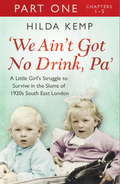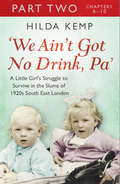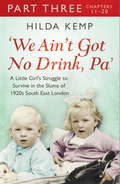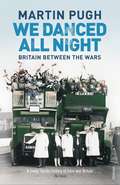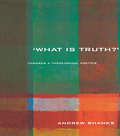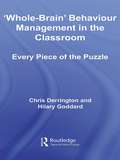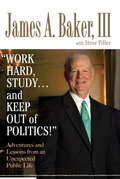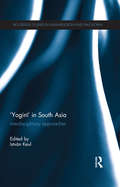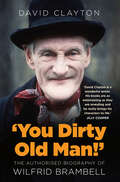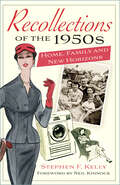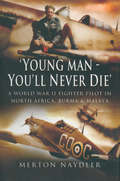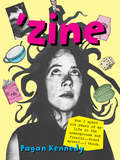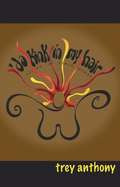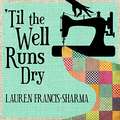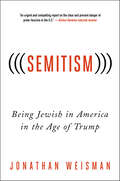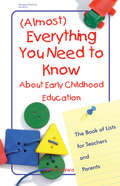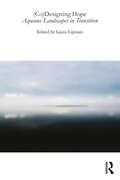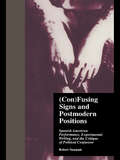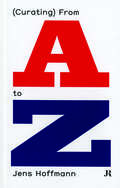- Table View
- List View
'We Ain't Got No Drink, Pa': Part 1
by Cathryn Kemp Hilda KempWe Ain't Got No Drink, Pa can either be read as full-length eBook or in 3 serialised eBook-only parts.This is PART 1 OF 3.'We ain't got no drink, Pa.' I trembled as I spoke. Then somewhere inside me I found the anger, the courage to answer him back. 'We don't have no grog cos you drank it all!' I knew he was going for me tonight, so I reckoned I might as well go down fighting after all. Growing up in the slums of 1920s and 30s Bermondsey, Hilda Kemp's childhood was one of chaos and fear. Every day was battleground, a fight to survive and a fight to be safe. For Hilda knew what it was to grow up in desperate poverty: to have to scratch around for a penny to buy bread; to feel the seeping cold of a foggy docklands night with only a thin blanket to cover her; to share her filthy mattress with her brothers and sisters, fighting for space while huddling to keep warm. She knew what it was to feel hunger - not the impatient growl of a tummy that has missed a meal; proper hunger, the type that aches in your soul as much as your belly. The eldest of five children, Hilda was the daughter of a hard drinker and hard hitter as well. A casual dockworker by day, a bare-knuckle fighter by night and a lousy drunk to boot, her pa honed his fists down the Old Kent Road and Blackfriars, and it was Hilda or her ma who bore the brunt of them at home. This is the powerful and moving memoir of Hilda's childhood growing up in dark, filthy, crime-ridden Bermondsey; a place where you knew your neighbours, where you kept your eyes down and your ears shut as defence against the gangs at war in the streets. It's a time when days were spent running wild down the docklands, jumping onto barges and stealing coal, racing through the dank back-streets of east London like water rats, dodging the milk cart or the rag-and-bone man. And out of this bleak landscape emerges a brave, resilient young girl whose life is a testament to the power of love and good humour. Moving, dazzling and sombre by turns, once opened this brilliant, seductive book will not let you rest.
'We Ain't Got No Drink, Pa': Part 1
by Cathryn Kemp Hilda KempWe Ain't Got No Drink, Pa can either be read as full-length eBook or in 3 serialised eBook-only parts. This is PART 1 OF 3. 'We ain't got no drink, Pa.' I trembled as I spoke. Then somewhere inside me I found the anger, the courage to answer him back. 'We don't have no grog cos you drank it all!' I knew he was going for me tonight, so I reckoned I might as well go down fighting after all. Growing up in the slums of 1920s and 30s Bermondsey, Hilda Kemp's childhood was one of chaos and fear. Every day was battleground, a fight to survive and a fight to be safe. For Hilda knew what it was to grow up in desperate poverty: to have to scratch around for a penny to buy bread; to feel the seeping cold of a foggy docklands night with only a thin blanket to cover her; to share her filthy mattress with her brothers and sisters, fighting for space while huddling to keep warm. She knew what it was to feel hunger - not the impatient growl of a tummy that has missed a meal; proper hunger, the type that aches in your soul as much as your belly. The eldest of five children, Hilda was the daughter of a hard drinker and hard hitter as well. A casual dockworker by day, a bare-knuckle fighter by night and a lousy drunk to boot, her pa honed his fists down the Old Kent Road and Blackfriars, and it was Hilda or her ma who bore the brunt of them at home. This is the powerful and moving memoir of Hilda's childhood growing up in dark, filthy, crime-ridden Bermondsey; a place where you knew your neighbours, where you kept your eyes down and your ears shut as defence against the gangs at war in the streets. It's a time when days were spent running wild down the docklands, jumping onto barges and stealing coal, racing through the dank back-streets of east London like water rats, dodging the milk cart or the rag-and-bone man. And out of this bleak landscape emerges a brave, resilient young girl whose life is a testament to the power of love and good humour. Moving, dazzling and sombre by turns, once opened this brilliant, seductive book will not let you rest.
'We Ain't Got No Drink, Pa': Part 2
by Cathryn Kemp Hilda KempWe Ain't Got No Drink, Pa can either be read as full-length eBook or in 3 serialised eBook-only parts.This is PART 2 OF 3.'We ain't got no drink, Pa.' I trembled as I spoke. Then somewhere inside me I found the anger, the courage to answer him back. 'We don't have no grog cos you drank it all!' I knew he was going for me tonight, so I reckoned I might as well go down fighting after all. Growing up in the slums of 1920s and 30s Bermondsey, Hilda Kemp's childhood was one of chaos and fear. Every day was battleground, a fight to survive and a fight to be safe. For Hilda knew what it was to grow up in desperate poverty: to have to scratch around for a penny to buy bread; to feel the seeping cold of a foggy docklands night with only a thin blanket to cover her; to share her filthy mattress with her brothers and sisters, fighting for space while huddling to keep warm. She knew what it was to feel hunger - not the impatient growl of a tummy that has missed a meal; proper hunger, the type that aches in your soul as much as your belly. The eldest of five children, Hilda was the daughter of a hard drinker and hard hitter as well. A casual dockworker by day, a bare-knuckle fighter by night and a lousy drunk to boot, her pa honed his fists down the Old Kent Road and Blackfriars, and it was Hilda or her ma who bore the brunt of them at home. This is the powerful and moving memoir of Hilda's childhood growing up in dark, filthy, crime-ridden Bermondsey; a place where you knew your neighbours, where you kept your eyes down and your ears shut as defence against the gangs at war in the streets. It's a time when days were spent running wild down the docklands, jumping onto barges and stealing coal, racing through the dank back-streets of east London like water rats, dodging the milk cart or the rag-and-bone man. And out of this bleak landscape emerges a brave, resilient young girl whose life is a testament to the power of love and good humour. Moving, dazzling and sombre by turns, once opened this brilliant, seductive book will not let you rest.
'We Ain't Got No Drink, Pa': Part 3
by Cathryn Kemp Hilda KempWe Ain't Got No Drink, Pa can either be read as full-length eBook or in 3 serialised eBook-only parts.This is PART 3 OF 3.'We ain't got no drink, Pa.' I trembled as I spoke. Then somewhere inside me I found the anger, the courage to answer him back. 'We don't have no grog cos you drank it all!' I knew he was going for me tonight, so I reckoned I might as well go down fighting after all. Growing up in the slums of 1920s and 30s Bermondsey, Hilda Kemp's childhood was one of chaos and fear. Every day was battleground, a fight to survive and a fight to be safe. For Hilda knew what it was to grow up in desperate poverty: to have to scratch around for a penny to buy bread; to feel the seeping cold of a foggy docklands night with only a thin blanket to cover her; to share her filthy mattress with her brothers and sisters, fighting for space while huddling to keep warm. She knew what it was to feel hunger - not the impatient growl of a tummy that has missed a meal; proper hunger, the type that aches in your soul as much as your belly. The eldest of five children, Hilda was the daughter of a hard drinker and hard hitter as well. A casual dockworker by day, a bare-knuckle fighter by night and a lousy drunk to boot, her pa honed his fists down the Old Kent Road and Blackfriars, and it was Hilda or her ma who bore the brunt of them at home. This is the powerful and moving memoir of Hilda's childhood growing up in dark, filthy, crime-ridden Bermondsey; a place where you knew your neighbours, where you kept your eyes down and your ears shut as defence against the gangs at war in the streets. It's a time when days were spent running wild down the docklands, jumping onto barges and stealing coal, racing through the dank back-streets of east London like water rats, dodging the milk cart or the rag-and-bone man. And out of this bleak landscape emerges a brave, resilient young girl whose life is a testament to the power of love and good humour. Moving, dazzling and sombre by turns, once opened this brilliant, seductive book will not let you rest.
'We Ain't Got No Drink, Pa': Part 3
by Cathryn Kemp Hilda KempWe Ain't Got No Drink, Pa can either be read as full-length eBook or in 3 serialised eBook-only parts. This is PART 3 OF 3. 'We ain't got no drink, Pa.' I trembled as I spoke. Then somewhere inside me I found the anger, the courage to answer him back. 'We don't have no grog cos you drank it all!' I knew he was going for me tonight, so I reckoned I might as well go down fighting after all. Growing up in the slums of 1920s and 30s Bermondsey, Hilda Kemp's childhood was one of chaos and fear. Every day was battleground, a fight to survive and a fight to be safe. For Hilda knew what it was to grow up in desperate poverty: to have to scratch around for a penny to buy bread; to feel the seeping cold of a foggy docklands night with only a thin blanket to cover her; to share her filthy mattress with her brothers and sisters, fighting for space while huddling to keep warm. She knew what it was to feel hunger - not the impatient growl of a tummy that has missed a meal; proper hunger, the type that aches in your soul as much as your belly. The eldest of five children, Hilda was the daughter of a hard drinker and hard hitter as well. A casual dockworker by day, a bare-knuckle fighter by night and a lousy drunk to boot, her pa honed his fists down the Old Kent Road and Blackfriars, and it was Hilda or her ma who bore the brunt of them at home. This is the powerful and moving memoir of Hilda's childhood growing up in dark, filthy, crime-ridden Bermondsey; a place where you knew your neighbours, where you kept your eyes down and your ears shut as defence against the gangs at war in the streets. It's a time when days were spent running wild down the docklands, jumping onto barges and stealing coal, racing through the dank back-streets of east London like water rats, dodging the milk cart or the rag-and-bone man. And out of this bleak landscape emerges a brave, resilient young girl whose life is a testament to the power of love and good humour. Moving, dazzling and sombre by turns, once opened this brilliant, seductive book will not let you rest.
'We Are Still Didene'
by Thomas McilwraithDetailing the history of the aboriginal village of Iskut, British Columbia over the past 100 years, 'We Are Still Didene' examines the community's transition from subsistence hunting to wage work in trapping, guiding, construction, and service jobs. Using naturally occurring, extended transcripts of stories told by the group's hunters, Thomas McIlwraith explores how Iskut hunting culture and the memories that the Iskut share have been maintained orally. McIlwraith demonstrates the ways in which these stories challenge the idealized images of Aboriginals that underlie state-sponsored traditional ecological knowledge (TEK) studies. McIlwraith instead illuminates how these narratives are connected to the Iskut Village's complex relationships with resource extraction companies and the province of British Columbia, as well as their interactions with animals and the environment.
'We Danced All Night': A Social History of Britain Between the Wars
by Martin PughMartin Pugh offers a uniquely untraditional view of Britain’s inter-war period; that among the many dramatic social changes taking place, our modern consumer society of dedicated shoppers effectively took shape during the 1930s.
'What is Truth?': Towards a Theological Poetics
by Andrew ShanksIn a culture where institutional religion is in decline there is a pressing need for new theological strategies. Andrew Shanks argues for a fresh 'theological poetics', providing an eloquent first step towards meeting these needs and an alternative strategy for reconciling Christian theology with poetic truth.
'Whole-Brain' Behaviour Management in the Classroom: Every Piece of the Puzzle
by Chris Derrington Hilary GoddardRepresenting a brave and insightful shift away from narrow perspectives on behaviour management, this book draws practitioners towards a more holistic understanding of ourselves and how we impact on children’s learning and behaviour. The authors’ brilliant new conceptual model of ‘whole-brain’ behaviour management challenges existing theories about the management of children’s behavioural issues. Their pioneering ‘whole-brain’ approach draws upon a range of influences and concepts that cross discipline boundaries, expanding on the practitioner’s understanding of the complexity of children’s behaviour through their own knowledge of neuroscience, biopsychosocial theory and interpersonal awareness. The book will take the reader through a process of self-evaluation in which their preferred ways of thinking, acting and relating will be explored and interpreted in order to help them understand the impact of their ‘personal style’ on how the children in their care behave. Offering new insights and creative solutions, this is a practical guide to coach practitioners in their personal and professional development, helping them to raise the achievement of children exhibiting even the most challenging of behaviour.
'Will the Circle be Unbroken?'
by Jane Dickson-Gilmore Carol La PrairieEmbraced with zeal by a wide array of activists and policymakers, the restorative justice movement has made promises to reduce the disproportionate rates of Aboriginal involvement in crime and the criminal justice system and to offer a healing model suitable to Aboriginal communities. Such promises should be the focus of considerable critical analysis and evaluation, yet this kind of scrutiny has largely been absent. 'Will the Circle be Unbroken?' explores and confronts the potential and pitfalls of restorative justice, offering a much-needed critical perspective.Drawing on their shared experiences working with Aboriginal communities, Jane Dickson-Gilmore and Carol LaPrairie examine the outcomes of restorative justice projects, paying special attention to such prominent programs as conferencing, sentencing circles, and healing circles. They also look to Aboriginal justice reforms in other countries, comparing and contrasting Canadian reforms with the restorative efforts in New Zealand, Australia, and the United States.'Will the Circle be Unbroken?' provides a comprehensive overview of the critical issues in Aboriginal and restorative justice, placing these in the context of community. It examines the essential role of community in furthering both Aboriginal and non-Aboriginal aspirations for restorative justice.
'Work Hard, Study...and Keep Out of Politics!': Adventures and Lessons from an Unexpected Public Life
by James Robert BakerThe real inside story of why Gerald Ford did not ask Ronald Reagan to be his running mate in 1976-and why Reagan did not pick Ford in 1980; the battle over Florida 2000; the aborted White House job switch that inadvertently opened the door to the Iran-Contra scandal; the Bush campaign's wish that Dan Quayle would offer to resign from the ticket in 1992; the White House turmoil in the dark days following the Reagan assassination attempt; and a great deal more . . . White House Chief of Staff (twice), Secretary of State, Secretary of the Treasury, and campaign chairman for three different candidates in five successive presidential campaigns-few people have lived and breathed politics as deeply as James Baker. Now, with candor and Texas-style storytelling, and not a few surprises, he takes us into his thirty-five years behind the scenes. None of it was planned. His grandfather, the "Captain," drilled this advice into him: "Work hard, study . . . and keep out of politics!" Then a personal tragedy changed the life of a forty-year-old Texas Democratic lawyer and he never looked back. From campaign horsetrading, which sometimes got rough ("Politics ain't beanbag," says Baker), to the inner councils of the Reagan and Bush administrations to the controversies of today, Baker offers frank talk and spellbinding narratives, along with personal appraisals of six presidents and a constellation of others. It was a long, unexpected journey from Houston, Texas, to Washington, D.C.-and you'll want to travel it with him.
'Yogini' in South Asia: Interdisciplinary Approaches
by István KeulIn different stages in the history of South Asian religions, the term yoginī has been used in various contexts to designate various things: a female adept of yoga, a female tantric practitioner, a sorceress, a woman dedicated to a deity, or a certain category of female deities. This book brings together recent interdisciplinary perspectives on the medieval South Asian cults of the Yoginis, such as textual-philological, historical, art historical, indological, anthropological, ritual and terminological. The book discusses the medieval yoginī cult, as illustrated in early Śaiva tantric texts, and their representations in South Asian temple iconography. It looks at the roles and hypostases of yoginīs in contemporary religious traditions, as well as the transformations of yoginī-related ritual practices. In addition, this book systematizes the multiple meanings, and proposes definitions of the concept and models for integrating the semantic fields of ‘yoginī.’ Highlighting the importance of research from complementary disciplines for the exploration of complex themes in South Asian studies, this book is of interest to scholars of South Asian Studies and Religious Studies.
'You Dirty Old Man!': The Authorised Biography of Wilfrid Brambell
by David ClaytonWilfrid Brambell was one of Britain’s most loved and complex character actors. As Albert Ladysmith Steptoe, the unscrupulous rag-and-bone man with questionable habits in Ray Galton and Alan Simpson’s long-running Steptoe & Son, he quickly became a household name with co-star Harry H. Corbett. But despite scores of other successes in roles on stage, TV and film, Brambell died a sad and lonely man.Alongside fame and fortune, ‘You Dirty Old Man!’ reveals how Brambell suffered unbelievable personal heartache, battling an inner turmoil that eventually drove him to drink as his marriage collapsed in the most deceitful circumstances imaginable. His torment led to a secretive life off camera where he did everything possible to stay out of the public eye.Featuring original interviews with film directors Richard Lester, Terence Davies and Tony Palmer, as well as recollections from his own family members, the family of Harry H. Corbett and those who worked alongside him, author David Clayton seeks to re-examine the legacy of a man whose loyal fanbase remains undiminished sixty years on from his heyday.
'You've Never Had It So Good!': Memories and Recollections of Life in the 1950s
by Stephen F Kelly Neil KinnockThe 1950s saw a major shift in the lifestyles of many in Britain. The austerity that had dogged the 1940s after the end of the Second World War began to give way to better times. Employment levels rose to new heights, white consumer goods appeared in shop windows for the first time, television replaced the radio in most homes, rock and roll was born, the National Health Service provided free health care to the nation, more children went to grammar schools, leisure time increased, families went on holiday, and the new Queen was crowned — bringing in a glorious new Elizabethan age.Including interviews with former Labour leader Lord Neil Kinnock, footballers Bobby Charlton, Wilf McGuinness and Terry Venables, radio producer, author and journalist Clare Jenkins, and the eminent historian Lord Peter Hennessy, among others, this delightful compendium of reminiscences will appeal to all who grew up in this post-war decade, whether in town or country, wealth or poverty. With chapters on schooldays, TV and radio, trips to the seaside, music and fashion, these wonderful stories are sure to jog the memories of all who remember this exciting era.
'Young Man, You'll Never Die': A World War II Fighter Pilot In North Africa, Burma & Malaya (Reminiscence Ser.)
by Merton NaydlerA British Royal Air Force pilot recounts fighting over African deserts and Asian jungles during World War II in this military memoir. Merton Naydler joined the RAF at the age of nineteen and served for the next six years until May 1946. He flew Spitfires and Hurricanes during a tour of duty that took him to North Africa, Burma, and Malaya. This well written and extremely entertaining memoir portrays wartime life in the desert environment where sand, flies, life under canvas made living and flying a daunting experience. When Naydler was posted to Burma he was filled with &“a deep and genuine dread.&” After a long uncomfortable trip, he joined 11 Squadron and was then faced with Japanese Zeroes in combat over dense tropical jungle rather than Bf 109s over a barren desert terrain. &“Daytime flying was hot as hell, the humidity intense&”—the author&’s description of his new posting that goes on to describe life in &“Death Valley,&” named because of the likeliness of falling victim to tropical disease rather than enemy aircraft . . . This is the story of a sergeant pilot who learned his trade the hard way in action over Africa and then honed his combat skills in the skies over Japanese-held tropical forests where he was eventually commissioned.
'Zine
by Pagan KennedyBack in print for the first time in a decade, this is the hilarious autobiography of a pioneer of the 1990s zine movement. A young woman named Pagan, having just graduated from a writing program at a very prestigious university, is left with a single burning question: Now what? She then takes an unusual step by deciding to invent her new self--the one the public will know--by starting her own magazine, one that will be written, created, and star none other than herself.
'da Kink in my hair: Voices of Black Womyn
by Trey AnthonySet in a West Indian hair salon in Toronto, da Kink in my hair gives voice to a group of women who tell us their unforgettable, moving, and often hilarious stories. Mixing laughter and tears—and told in words, music, and dance—the stories explore the hardship, struggles, and joys of black women's lives.
'til The Well Runs Dry: A Novel
by Lauren Francis-SharmaLauren Francis-Sharma's 'Til the Well Runs Dry opens in a seaside village in the north of Trinidad where young Marcia Garcia, a gifted and smart-mouthed 16-year-old seamstress, lives alone, raising two small boys and guarding a family secret. When she meets Farouk Karam, an ambitious young policeman, the risks and rewards in Marcia's life amplify forever. On an island rich with laughter, Calypso, Carnival, cricket, beaches and salty air, sweet fruits and spicy stews, the novel follows Marcia and Farouk from their amusing and passionate courtship through personal and historical events that threaten Marcia's secret, entangle the couple and their children in a scandal, and endanger the future for all of them. 'Til the Well Runs Dry tells the twinned stories of a spirited woman's love for one man and her bottomless devotion to her children. For listeners who cherish the previously untold stories of women's lives, here is a story of grit and imperfection and love that has not been told before.
(((Semitism))): Being Jewish in America in the Age of Trump
by Jonathan WeismanIn the wake of Donald Trump's election and the Pittsburgh synagogue massacre, (((Semitism))) is a powerful book that examines how we can fight anti-Semitism in AmericaA San Francisco Chronicle Reader RecommendationThe Washington Post: "Timely...[A] passionate call to arms."Jewish Book Council: "Could not be more important or timely."Bernard-Henri Lévy: "It would be wonderful if anti-Semitism was a European specialty and stopped at the border with the United States. Alas, this is not the case. Jonathan Weisman’s new book (((Semitism))) shows why..."Michael Eric Dyson: "With eloquence and poignancy Weisman shows how hatred can slowly and quietly chew away at the moral fabric of society. We now live in an age where more than ever bigotry and oppression no longer need to hide in fear of reproach. The floodgates have opened. This is much more than a personal response to the bigotry he experienced because of his Jewishness; Weisman has written a manifesto that outlines the dangers of marginalizing and demonizing all minority groups. This powerful book is for all of us." Anti-Semitism has always been present in American culture, but with the rise of the Alt Right and an uptick of threats to Jewish communities since Trump took office, including the the Pittsburgh synagogue massacre, New York Times editor Jonathan Weisman has produced a book that could not be more important or timely. When Weisman was attacked on Twitter by a wave of neo-Nazis and anti-Semites, witnessing tropes such as the Jew as a leftist anarchist; as a rapacious, Wall Street profiteer; and as a money-bags financier orchestrating war for Israel, he stopped to wonder: How has the Jewish experience changed, especially under a leader like Donald Trump?In (((Semitism))), Weisman explores the disconnect between his own sense of Jewish identity and the expectations of his detractors and supporters. He delves into the rise of the Alt Right, their roots in older anti-Semitic organizations, the odd ancientness of their grievances—cloaked as they are in contemporary, techy hipsterism—and their aims—to spread hate in a palatable way through a political structure that has so suddenly become tolerant of their views.He concludes with what we should do next, realizing that vicious as it is, anti-Semitism must be seen through the lens of more pressing threats. He proposes a unification of American Judaism around the defense of self and of others even more vulnerable: the undocumented immigrants, refugees, Muslim Americans, and black activists who have been directly targeted, not just by the tolerated Alt Right, but by the Trump White House itself.
(180) Days of Quibi
by David J. Collis Terrence ShuMobile streaming app Quibi was ready to take the entertainment world by storm at its April 2020 launch. Backed by $1.75 billion, influential investors from Hollywood to Wall Street eagerly anticipated early success for this brainchild of Meg Whitman, former CEO of Hewlett Packard Enterprise, and Jeffrey Katzenberg, former chairperson of Walt Disney Studios and co-founder of DreamWorks Pictures. Quibi's value proposition was to fill a 'white space' through seven to ten minute dramas, on a platform that was technologically sophisticated for users and extremely copyright friendly for content creators. Six months later, a disappointing lack of demand cornered Quibi into closing shop. Was it poor timing, or inherent business model viability? This case prompts discussion on the complete strategy landscape, from defining the opportunity set and value potential to understanding the ultimate outcome.
(Almost) Everything You Need to Know About Early Childhood Education
by Judy FujawaVeteran teacher Judy Fujawa offers over two decades of experience in her warm, witty book of lists. Filled with the imminently practical (Creative Gift Ideas, Things to Do With Boxes, Supplies or Materials That Encourage Children to Be Creative) to the philosophical (How Children Learn, Answers to: Why Read to My Child?) to the hilarious (The "F" Words Children Are Allowed to Use, Things Found in Children's Pockets), these lists cover nearly everything one needs to know to work with and raise young children.
(An)Archive: Childhood, Memory, and the Cold War
by Zsuzsa Millei;Nelli Piattoeva;Iveta Silova;Mnemo ZINWhat was it like growing up during the Cold War? What can childhood memories tell us about state socialism and its aftermath? How can these intimate memories complicate history and redefine possible futures? These questions are at the heart of the (An)Archive: Childhood, Memory, and the Cold War. This edited collection stems from a collaboration between academics and artists who came together to collectively remember their own experiences of growing up on both sides of the ‘Iron Curtain’. Looking beyond official historical archives, the book gathers memories that have been erased or forgotten, delegitimized or essentialized, or, at best, reinterpreted nostalgically within the dominant frameworks of the East-West divide. And it reassembles and (re)stores these childhood memories in a form of an ‘anarchive’: a site for merging, mixing, connecting, but also juxtaposing personal experiences, public memory, political rhetoric, places, times, and artifacts. These acts and arts of collective remembering tell about possible futures―and the past’s futures―what life during the Cold War might have been but also what it has become. (An)Archive will be of particular interest to scholars in a variety of fields, but particularly to artists, educators, historians, social scientists, and others working with memory methodologies that range from collective biography to oral history, (auto)biography, autoethnography, and archives.
(Co)Designing Hope: Aqueous Landscapes in Transition
by Laura CiprianiExtreme weather events, droughts, floods, shifts in precipitation and temperature patterns, melting glaciers, sea-level rise, water salinization, and more generally, changes in the water cycle remind us that the climate crisis is mostly a water crisis. Perhaps even more serious is a crisis of imagination connected with thought and with creative, far-sighted action able to combine the visionary and the pragmatic. A response to these two crises can be provided by the disciplines of landscape architecture: these have always featured a plural, collective approach that comprises or originates from living systems and natural forces, on the involvement of human and nonhuman communities in the design process, and the inclusion of the time variable in future plans—without neglecting the necessary flexibility of creative and pragmatic thinking. How can landscape design and different forms of collaboration open new doors to face climate and water challenges? What hopes can spring from collective design in its broader meaning?This book sets out notions and ideas on water landscapes and (co)designed practices, identifying what hopeful routes might be taken for the three states of aqueous landscapes in transition—liquid, solid, and gas. The chapters show different scales and levels of design and collaborative practices: from large and governmental projects to small bottom-up interventions; from creative collaboration among designers to traditional community design; from participatory processes to nature as a co-designer for tackling the climate crisis. People, animals, plants, water, ice, fog, clouds, wind, sand, and rocks—all contribute to the cosmos’ landscape symphony, and designing together can become a seed of hope to listen and embrace the Earth’s climate changes.
(Con)Fusing Signs and Postmodern Positions: Spanish American Performance, Experimental Writing, and the Critique of Political Confusion
by Robert NeustadtFirst Published in 1999. Routledge is an imprint of Taylor & Francis, an informa company.
(Curating) From A to Z
by Claire Fontaine Jens Hoffman<P> (Curating) From A to Z offers a summary of the development of curatorial practice over the last two decades seen through the eyes of curator Jens Hoffmann. In this publication each letter of the alphabet evokes a particular word related to the world of exhibition making: From A (as in Artist) and B (as in Biennial) to R (as in Retrospective) and W (as in White Cube). <P> Employing a diarist style, the curator presents his personal curatorial alphabet with a similar transparency and the same idiosyncratic character revealed in many of his exhibitions. The entries are not only stimulating and intellectually rigorous, but also emotionally engaging.
